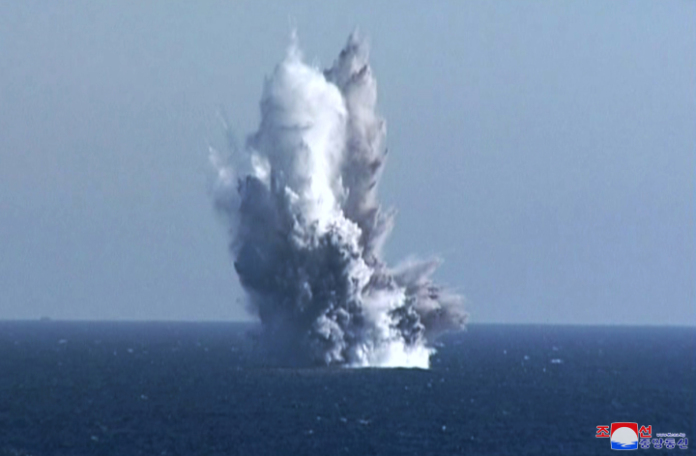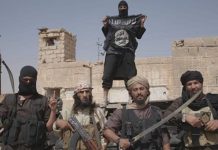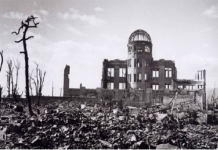Being perfectly aware who stood in front of me as a negotiator, I heeded the words of A. Kamilov and tried to remained as reserved as possible, which is a mandatory attribute of diplomats. He also probably took the lack of time into consideration so, looking and sounding worried, he shared that “Islam-aka gave a special obligatory instruction to add the proposal on turning Central Asia into a nuclear-weapon-free zone to the Declaration” and if his proposal was not added to the Declaration, he would pay with his life.
Although at first sight the question was put point-blank, I noticed that an unexpected, no-notice conversation with a touch of humor did not make the experienced diplomat A. Kamilov lose the serious and constructive attitude that could be read in his face. He chose that path to express his unshakable diplomatic integrity in articulating the position of his leader by preserving its accuracy and authenticity.
It was obvious that his mission was to secure support and to receive equivalent information in return for sharing some reliable information to another diplomat. Having waited for my opinion, after a brief pause he asked to give them maximum support.
I felt that for me the negotiations arrived to a very crucial moment. It was because E. Idrissov did not let me know in our phone conversation that he advised the Uzbek delegation to speak with me as an expert. I wondered why he did not let me know but did not say anything to A. Kamilov.
Both parties were aware that in diplomacy, especially in such very delicate and important issue, it is not allowed to tell lies. There is a rule that lying discredits not only the diplomat and hampers their further activities but also the state that they represent. That is mentioned in the book by J. Wood and J. Serres where it is noted that if a diplomat is caught lying, that might mean complete discrediting.
Although the diplomacy of Western countries that we know from books that we read, is not particularly pure in moral terms, yet its historical merits are infinite.
It was shaped based on diplomatic experience of great powers. However,unfortunately, it is not common knowledge that in works by famous, significant,talented writers such as Goethe, Marcel Proust, J. de La Bruyère, J. Aldridge,Honoré de Balzac and in other literature diplomats are not described in the best light.
It is known that old-school diplomats being adherers to Machiavellianism that was fashionable and prevailed in Western diplomacy until the 18th century were characterized not only by their intellect but also by such traits as cunning,scheming and duplicity. Niccolo Machiavelli believed that the art of diplomacy consisted in hiding the reality with the words, that is, in lying.
Machiavelli put forward the interest of the state as the main political principle justifying any, even the most unseemly means in reaching the goal.
Perhaps one of the first persons to oppose Machiavellianism in earnest, who made the case for honest diplomacy and against deceit in negotiations was the French diplomat François de Callières.
He wrote, “The good negotiator […] will never found the success of his mission on promises which he cannot redeem or on bad faith. It is a capital error, which prevails widely, that a clever negotiator must be a master of the art of deceit.” François de Callières maintained that “deceit indeed is but a measure of the smallness of mind of him who employs it, and simply shows that his intelligence is too meagrely equipped to enable him to arrive at his ends by just andr easonable methods” and stressed that “honesty […] is the best policy, a lie always leaves a drop of poison behind.”
Therefore, taking into account that a diplomat should have harmony of character and speech as well as bearing in mind the proverb “look before you leap”, before saying anything I remembered the following maxim by François de Callières, “be respectful to princes; affable and approachable with his equals;considerate to his inferiors, and civil and honest with everybody.”
I stressed that we respected the intention of the fraternal Uzbek nation to add their proposal to the Declaration; that such proposal did not contradict the interests that the Declaration pursued; that it was in line with the foreign policy position of the Republic of Kazakhstan; but I mentioned that at the multilateral meeting that was about to begin we should take into account the views and positions of Kyrgyzstan, Tajikistan and Turkmenistan; and that we would make every effort through multilateral negotiations to achieve a positive outcome.
I could tell by the eyes and the expression of A. Kamilov that he liked what I said. Yet I learned a lesson from the following cautionary words by the English diplomat H. Nicolson, “He [A diplomat] must realize that all foreigners are regarded with suspicion and must therefore conceal his astuteness and appear as a pleasant man of the world.”
Zhanibek Karibzhanov, Deputy Prime Minister of the Republic of Kazakhstan, chaired the meeting that brought together Deputy Prime Ministers of Central Asian countries. The next day I was quite surprised to notice that my surname was missing from the list of Foreign Ministry representatives to participate in the upcoming summit of Central Asian countries’ Presidents.
Whoever made that list should have put me on it, as there was no other expert who was involved in the process of drafting the documents from start to finish and was competent enough to answer possible questions during the negotiations. That said,most of the colleagues who had nothing to do with the issue were on the list.
At first, I was about to leave everything as it was and just accept the situation. But who would have been responsible for the decisions taken if there had been problems in making amendments to a particular document? Having thought about that, I went to E. Idrisov and informed him that the meeting had gone well as planned but noted that the list of diplomats participating in the upcoming summit did not feature my personal details. Understanding the circumstances, he immediately called someone and asked to include me on the list of diplomats to participate in the summit. I had to act on the principle of one American diplomat who kept saying, “The success of a diplomat depends on their own behavior therefore a diplomat must be a person of determination and firmly defend their interests and views.”
At the end of the summit, Presidents of Central Asian countries signed five documents and adopted the Almaty Declaration. However, the process of signing the documents was not as smooth as we wished it to be. As proposed by I. Karimov, President of the Republic of Uzbekistan, a number of amendments were introduced to the texts of some of the documents.
In the meantime, there were unforeseen situations, just as I supposed. Kairat Sarybai, Head of Press Service, who led the organizational work, suddenly invited me to his office and requested me to introduce each of the proposed changes to the document texts and prepare their new versions thus placing all the responsibility for that task on me. Although I had known this person at a distance, but we met face-to-face for the first time. First of all, I wondered how he knew me and why he was tasking me, didn’t he have his own assistants? But given the lack of time and noticing how agitated K. Sarybai looked I immediately set about fulfiling the task I was entrusted with. A multitude of changes had to be introduced to the documents while the Presidents were having a coffee break. It was easy to get lost inside the building where I had never been before. Furthermore, to my great misfortune, the office of the employee tasked with making changes to the texts of draft documents was located on the top floor. As it turned out, I had to go up several floors,describe the required changes and then deliver the new version of the revised document back to the meeting hall. That said, the most difficult task was the correct incorporation of proposals and changes into the document text as voiced by Presidents of Central Asian countries.Once all Presidents expressed their views on the proposal by I. Karimov and reached a consensus, they went to a coffee break. However, when it came to elaborating the final version agreed by the Presidents, the opinions of N. Abykaev and Deputy Minister V. Alesin who were seated in the back rows, as well as other participants were divided. Each of them relied on what they heard for themselves.Having listened closer, I realized that some opinions did not fit together at all.
Suddenly, I was fully taken aback at the thought that it was me who had to bring the agreed version of the document back to the meeting hall but the next thing I did, I quickly collected myself. In turn, K. Sarybai who did not offer his own version asked me to provide a new draft document in the fast track before the end of the break. Walking up the stairs, I agonized over which option to incorporate. I sweated at the thought that it would be a real embarrassment if I. Karimov did not approve the new document text with the introduced amendments. Taking the risk, I brought the amended version of the document as I personally heard and perceived.
- Having returned from the break, the Presidents began to read the new document text silently. I was seized with great anxiety. Those minutes seemed devastatingly long to me. Eventually, the long-expected moment came. I. Karimov was the first to express his agreement with the amended text, other Presidents aligned themselves with him and started signing the documents. This is how the historic document called the Almaty Declaration was adopted.
In August 1997, I was sent on a long foreign trip to India to work in the Kazakhstan embassy. There was no Internet back then. It was only once in a month that we received newspapers and journals from Kazakhstan through our diplomatic channels. One day I was over the moon when I read in a newspaper that the UN General Assembly headed by Secretary-General Kofi Annan had adopted a special resolution on the Almaty Declaration. That was the first sign that my work was duly appreciated. The process of shaping a nuclear-weapon-free region that has begun since then, spread beyond the personal commitments by Presidents of Central Asian countries and became a common task for all.
Meanwhile, N. Nazarbaev, President of Kazakhstan, issued the decree On Closing the Semipalatinsk Nuclear Test Site on August 29, 1989 and the initiative on establishing a nuclear-weapon-free zone in Central Asia was put forward by I. Karimov, President of Uzbekistan, at the 48th session of the UN General Assembly in 1993. Thus, the decisive political impetus requiring joint efforts was given at the summit of heads of Central Asian states that was held in Almaty on February 28, 1997. The Almaty Declaration adopted that day calls for supporting the idea of establishing a Nuclear-Weapon-Free Zone (NWFZ). As a result of the “Central Asia — a Zone Free of Nuclear Weapons” international conference held in Tashkent in September that year, an Expert Group was established to prepare the key provisions of the relevant treaty. Its text was discussed in Ashgabad,Samarkand and Geneva with the active UN assistance. In December 1997, the UN General Assembly adopted the resolution Establishment of a Nuclear-Weapon-Free Zone in Central Asia demonstrating unequivocal international support for the determination of the Central Asian states to achieve their goal.(To be continued).
 Author:Mursal-Nabi Tuyakbaev,Honored Diplomatic Service Officer of the Republic of Kazakhstan,Associate Member of the National Academy of Natural Sciences of Kazakhstan.
Author:Mursal-Nabi Tuyakbaev,Honored Diplomatic Service Officer of the Republic of Kazakhstan,Associate Member of the National Academy of Natural Sciences of Kazakhstan.






